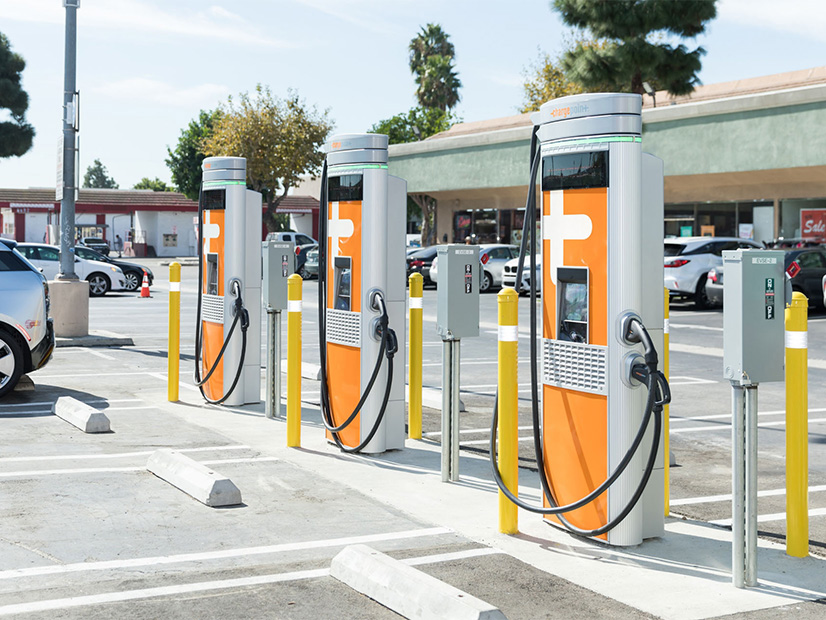The U.S. Department of Transportation on Tuesday announced a new round of funding aimed at putting electric vehicle chargers in “urban and rural communities, downtown areas and local neighborhoods, particularly in underserved and disadvantaged communities.”
The Infrastructure Investment and Jobs Act (IIJA) authorized the $2.5 billion for the Charging and Fueling Infrastructure (CFI) Discretionary Grant Program, to be used over five years for competitive grants that will help put chargers in communities, as opposed to the state and interstate highway chargers being funded by the law’s National Electric Vehicle Infrastructure (NEVI) program.
“By helping bring EV charging to communities across the country, [CFI] is modernizing our infrastructure and creating good jobs in the process,” Transportation Secretary Pete Buttigieg said in a DOT press release. “With today’s announcement, we are taking another big step forward in creating an EV future that is convenient, affordable, reliable and accessible to all Americans.”
Transportation accounts for the largest share of U.S. greenhouse gas emissions — 38% — according to figures from the Congressional Budget Office. EV sales are growing, having hit close to 6% of all new car sales in 2022, but lack of publicly available chargers and range anxiety still remain significant barriers to adoption, according to a recent analysis from the World Economic Forum.
The U.S. currently has about 130,000 publicly available EV chargers, according to figures from the White House, but President Biden has committed to increasing that number to 500,000 by 2030.
With $5 billion from the IIJA, NEVI has provided formula-based funding to all 50 states, Puerto Rico and D.C. to help build out a national network of EV chargers.
The NEVI guidelines call for federally funded chargers to be installed every 50 miles along major highways, no more than one mile off an exit. The Federal Highway Administration approved the initial state plans for the funding, as required under the IIJA, in September. The agency also recently finalized the technical standards that all federally funded chargers will have to meet, including any installed under the CFI program.
CFI is meant to build on NEVI, which is focused on “enabling long-distance trips along the national highway system,” according to Monday’s funding announcement.
Beyond reducing greenhouse gas emissions and accelerating the adoption of EVs, CFI’s specific goals include supplementing — but not supplanting — private sector investment, promoting “broad public access to a national charging and alternative fuel infrastructure network,” and implementing environmental justice objectives.
The CFI funds are divided into two programs, each receiving $1.25 billion, according to the DOT. The Community Program will “strategically deploy publicly accessible EV charging infrastructure, and hydrogen, propane or natural gas fueling infrastructure in communities,” The focus here will be on installing chargers in public locations such as public or privately owned parking facilities, public buildings, public schools and public parks.
Awards for this program will range from $500,000 to $15 million and may be used to contract with a private, third-party entity. Projects will be “expected to reduce greenhouse gas emissions and to expand or fill gaps in access to publicly accessible infrastructure.”
The Corridor Program will put chargers along “designated alternative fuel corridors.” Minimum awards here will be $1 million, with no maximum amount, and the funds must be used to contract with a private third party.
The first round of funding, covering 2022 and 2023, will provide $700 million for CFI, divided equally between the Community and Corridor programs. Applications are due May 30, and organizations can submit applications for and receive funds from both programs.
NEVI vs. CFI
The FHWA, which will oversee both CFI programs, will prioritize projects “that address environmental justice, particularly for communities such as rural and low- and moderate-income neighborhoods that may disproportionately experience the consequences of climate change and other pollutants,” the press release said.
Both programs will also require projects to be accessible to and usable by individuals with disabilities, according to the funding announcement.
“FHWA is committed to helping towns and cities, large and small, build modern, sustainable infrastructure that promotes equity and opportunity for their local economies and net-zero emissions for the nation by 2050,” Administrator Shailen Bhatt said. “By encouraging the adoption and expansion of EV charging and alternative fuels, CFI Program investments have the potential to significantly address the transportation sector’s outsized contributions to climate change.”
Launched in February 2022, NEVI was “initially focused on enabling long distance trips along the National Highway System,” according to the CFI funding announcement. But the state plans submitted to FHWA for the first round of funding also pointed to challenges in implementing the program.
For example, many states reported that charging stations could not be installed every 50 miles in certain remote regions without adequate electric distribution systems. Other regions, where distribution systems were already constrained, would need significant upgrades to handle the 150-kW DC fast chargers required under federal standards.
CFI is intended to build on NEVI, with several specific goals, including supplementing but not supplanting private sector investment, improving broad public access to “a national charging and alternative fuel infrastructure network,” and advancing environmental justice goals.
Technical standards for both programs include requirements for each charging station to include at least four DC fast-charging ports or Level 2 (L2) charging ports. DC fast chargers are required for charging stations on AFCs and must have industry-standard connectors (plugs) that allow them to charge any EV.


